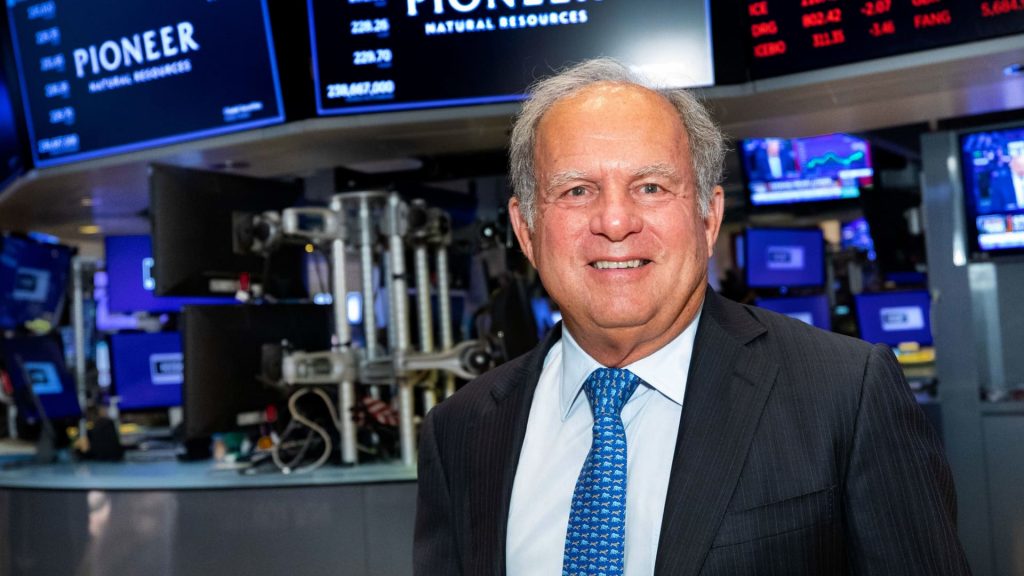Pioneer CEO says the oil company will keep returning most of its cash flow to investors
Pioneer Natural Resources (PXD) CEO Scott Sheffield said the oil company plans to continue returning most of its cash flow to shareholders, noting the “growth days of the industry are over.” That was just one of the takeaways from Sheffield’s wide-ranging interview with CNBC’s Jim Cramer on Wednesday. Sheffield, who founded Pioneer 25 years ago, is coming off a great quarter in which the Club holding beat on both the top and bottom lines. The company also returned more than 95% of its free cash flow to investors — a move Sheffield said is key to retaining shareholders. Here’s a full breakdown of what Sheffield had to say, including his thoughts on the Democrats’ recently passed Inflation Reduction Act and opportunities in natural gas. Methane tax Sheffield told Cramer he’s not particularly concerned about the tax on methane emissions that was included in the Democrat’s Inflation Reduction Act, which President Joe Biden signed into law Tuesday. Although industry lobbying group American Petroleum Institute opposes the legislation, which provides a number of provisions to bolster renewable energy, Sheffield said he supports “almost all” of its provisions. He didn’t specify which he dislikes, but noted he believes the U.S. needs all energy sources — wind, solar and nuclear alongside oil and gas. “We’ve led the Permian Basin in regard to reducing flaring methane intensity,” the CEO contended. “We recently joined the Oil and Gas Methane Partnership, which is part of the [United Nations]. We’re at 0.5%, half of one percent, in regard to flaring. We’re going to get it down to two-tenths of one percent, so we’re not really worried about the methane tax.” The tax on methane emissions is set to kick in during calendar 2024 at $900 per metric ton of methane and reach $1,500 per metric ton in 2026. However, for natural gas production facilities the charge only is in effect on methane emissions that “exceed 0.2% of the natural gas sent to sale from such a facility,” according to the Congressional Research Service. That could explain why Sheffield is not worried about the tax, given Pioneer’s intentions to further reduce flaring intensity. Production and dividend Pioneer remains committed to its newfound production discipline, Sheffield told Cramer, stressing the importance of returning money to shareholders through its fixed-plus-variable dividend. All else being equal, investing more heavily to expand production would cut into free cash flow, leaving Pioneer with less money available to distribute back to investors. In its most recent quarter, over 95% of the company’s free cash flow went back to shareholders via dividends and buybacks, which the Club loves to see because that’s a key reason we own the stock. Pioneer’s declared quarterly dividend payout of $8.57 per share equals a roughly 15% yield, based on the stock’s closing price Tuesday. “We have to deliver free cash flow. We have to return it to the shareholders, so I think the growth days are over for the industry,” Sheffield said. “Permian is still growing. … It’s most of the growth in U.S. oil production. We’re growing at 5%, but we’re going to do that long term [and] return most of the cash flow back to the shareholders.” Sheffield reiterated that Pioneer prioritizes dividends over buybacks, saying that’s what investors have told the company is their preferred capital return strategy. That said, the CEO said management will be opportunistic with share repurchases. For example, in July, Pioneer bought back $250 million worth of stock at an average price of $213 per share. That’s well below its 52-week high of $288.46 per share in May. LNG opportunities The U.S. became the world’s largest exporter of liquified natural gas (LNG) in the first six months of 2022. Among the reasons for that is increased demand from Europe, which is suffering an energy-price crisis following Russia’s invasion of Ukraine and related disruptions to natural gas supply. Cramer asked Sheffield where Pioneer stood on being able to export any of the natural gas it produces. While that could be financially lucrative to Pioneer, exporting natural gas requires conversion to LNG, which involves a specific cooling process so it can be stored and transported overseas. “Right now, we’re sending all of our natural gas to the Gulf Coast. We’re sending some to the California markets. There is more pipelines being built from the Permian to the Gulf Coast over the next two years. We have seriously considered doing something with Cheniere and others on LNG to get it to Europe, or to get it to Asia,” Sheffield said. “The biggest issue for us is that the next set of LNG plants are 2027, 2028. They want you to sign a 15-year contract. So, we have to guess what [are natural gas prices] going to be from 2028 to 2043. … So, so far we’ve held back, but eventually we’ll probably do something.” (Jim Cramer’s Charitable Trust is long PXD. See here for a full list of the stocks.) As a subscriber to the CNBC Investing Club with Jim Cramer, you will receive a trade alert before Jim makes a trade. Jim waits 45 minutes after sending a trade alert before buying or selling a stock in his charitable trust’s portfolio. If Jim has talked about a stock on CNBC TV, he waits 72 hours after issuing the trade alert before executing the trade. THE ABOVE INVESTING CLUB INFORMATION IS SUBJECT TO OUR TERMS AND CONDITIONS AND PRIVACY POLICY , TOGETHER WITH OUR DISCLAIMER . NO FIDUCIARY OBLIGATION OR DUTY EXISTS, OR IS CREATED, BY VIRTUE OF YOUR RECEIPT OF ANY INFORMATION PROVIDED IN CONNECTION WITH THE INVESTING CLUB. NO SPECIFIC OUTCOME OR PROFIT IS GUARANTEED.
Scott Sheffield, CEO, Pioneer Natural Resources at the NYSE, Aug. 17, 2022.
Source: NYSE





